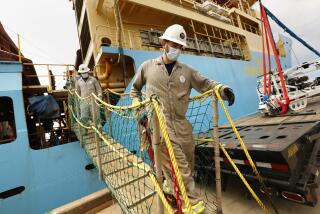Keeping the Oceans Clean
Your excellent editorial (“Japan and the Whales,” Feb. 20) exposing Japan’s defiance of the International Whaling Commission points up a crucial issue in global economics and environment--the oceans are a vast “commons” shared by the entire world community and they must be protected by international law.
The Japanese decision to proceed with its plan to kill 300 Minke whales without waiting for commission approval (which later was denied) weakens international agreements to protect ocean resources, especially fish and whales.
The report of the United Nations’ World Commission of Environment and Development warned: “Most major familiar fish stocks throughout the waters over the continental shelves, which provide 95% of the world’s fish catch, are now threatened by overfishing.”
Toxic pollution threatens fish resources as well, especially in coastal estuaries which are the toxic “sinks” for most industrial and urban pollution.
The ocean is the great balance wheel among the biological systems which nurture life as it exists now and has existed for thousands of years.
The coastal nations of the world which control 200 miles of ocean boundaries are responsible for fisheries and resource management within those so-called exclusive economic zones but management has been slipshod at best, including here in the United States. Major ocean fisheries have been overfished or are reaching biological limits. Of the 19 major fisheries studied by the Food and Agriculture Organization, the stocks of four have been exhausted and nine others face extinction.
International conservation measures are needed but probably are not attainable for now. So individual countries like the United States and Japan, which has the largest catch in the world, must exercise restraint in their own waters and set examples.
Reducing ocean pollution also begins at home. The city of Los Angeles has begun a program to clean up its ocean sewage problem. Los Angeles County should follow suit. It has applied for a waiver to continue dumping highly toxic sludge off Palos Verdes, one of the most dangerously contaminated areas along the Pacific coast. That waiver must be denied by the Environmental Protection Agency and then the EPA should get on with cracking down on other ocean and estuary polluters.
TED DANSON
President
American Oceans Campaign
Santa Monica
More to Read
Sign up for Essential California
The most important California stories and recommendations in your inbox every morning.
You may occasionally receive promotional content from the Los Angeles Times.









